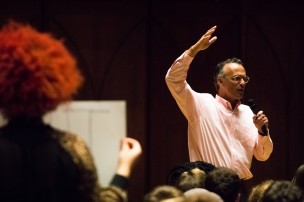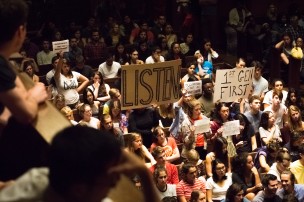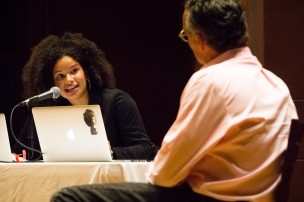On Wednesday, Sept. 16 students and faculty gathered in the Memorial Chapel for the University’s first “State of School” address. Students were provided the opportunity to make their voices heard within the administrative and Board of Trustees discussions.
On Wednesday, Sept. 16, students and faculty gathered in the Memorial Chapel for the University’s first “State of the School” address. The event was co-sponsored by the Wesleyan Student Assembly (WSA) and campus publications The Ankh, The Argus, and Wesleying. The event provided students with the opportunity to make their voices heard within the administrative and Board of Trustees discussions.
Prior to the discussion, WSA President Kate Cullen ’16 sent out an online form for students to submit questions for University President Michael Roth to respond to at the discussion. Several of these questions were brought up at the event; the rest, due to time constraints, were sent to Roth’s office for him to read on his own accord. Students were also able to direct comments toward members of the Board of Trustees as they will be on campus this upcoming weekend for their Fall Retreat.
“My goal is to start this year differently than years are usually started,” Cullen said. “There are a lot of people on campus who are already hurting, and we have a lot of issues going on that are really detrimental to our campus, and I think a lot of that stems from the lack of communication between the administration and the students, and that students’ voices are not being heard.”
While the event encouraged students and Roth to push their boundaries, Cullen announced the presence of a safe space with trained support services for students to utilize should they feel the need. Nikita Rajgopal ’17 was stationed in the chapel basement to provide assistance.
“I was in a conference room in the basement of the Chapel that the WSA had established as a safe space/debriefing room for students who wanted to leave the discussion upstairs with President Roth because they felt upset, or triggered,” Rajgopal said. “Whenever there are these large group discussions that have the potential to bring up serious and sensitive topics, it’s important to establish the norm that the conversation is not going to be comfortable, safe, or healthy for all participants. As the [Sexual Response Resource Team] SART Intern, I deal with these situations a lot in the context of sexual violence. The concept of a safe space seems very logical to people in that sort of context; however, conversations about race, class, as well as drugs and other substances can also cause discomfort to the extent that an individual feels that it is necessary to leave a large-scale conversation.”
Cullen began the discussion by explaining the intention, history, and purpose of this event. She introduced the community guidelines and informed the audience of the presence of safe space moderators.
Though Cullen acknowledges that this singular event will not spur overnight change, she is optimistic that the conversations will continue well beyond September 2015.
“I’m hoping, with this event, that we can start this year on a really high note of opening up that line of communication, and obviously all these problems we’re having are not going to be solved overnight,” she said. “It’s going to take probably years of committed work, but I want this to be a jumping-off point, where students can find a voice together advocating for the things they need and how they feel, and that President Roth accepts that, and we find ways to work together.”
Following the introduction, Roth took the stage. Upon beginning his speech, several students stood up with large posters with phrases including “Listen;” “Tuition Up, Aid Down;” “No transparency = No honesty;” “AFAM Is Why;” “Restore X House;” “Injustice is not an investment;” “First gen first;” “Protect Survivors;” and others. Roth read the signs out loud, then proceeded to discuss solutions and how to use the growing endowment.
“I have been talking to the Board [of Trustees] about how we should use the resources that we have from the endowment, which is going up from the ‘This Is Why’ campaign and from revenue,” Roth said. “Should we have more faculty for students? Should we have more financial aid? Should we do more work on the campus to modernize technology, social spaces? What is clear is that you can’t do all those things, at least not well.”
He proceeded to discuss the student culture at the University, and what makes it unique.
“I don’t think people come to Wesleyan primarily because of ranks,” Roth said. “When we ask people why they choose Wesleyan, the most important factor is the student culture. It’s the student culture that is self selecting and self-perpetuating…. It makes this university different from any other school I have ever seen. So often [the reason people come] is because you’ve met other students here…that don’t take any shit but are generous, who refuse to be fooled…and are the best for their community, but aren’t just interested in their own little community.”
Once Roth completed his introductory speech, the three moderators—Jessica Zalph ’16 from The Argus, Hailey Broughton-Jones ’18 from The Ankh, and Henry Vansant ’18 from the WSA—read out loud the questions sent in by the students.
The first question addressed was submitted from a student who inquired about a plan to make the University more transparent.
“Clearly there is a sense that decisions that I make [and] that other administrators make, are made in a vacuum,” Roth said. “I don’t think that’s true. [We] want to listen to opinions from a variety [of people]. I am happy to create venues for exchanges between the administration needs in particular, and my colleagues and the students and student groups.”
Further questions tackled the issue of returning the University’s admissions process to fully need-blind and the negative impact of need-aware admissions.
Another student submitted a question about the unanimously-passed WSA resolution asking the school to provide funding for more full-time therapists at the University’s Counseling and Psychological Services (CAPS) to address the exceedingly long wait times students currently experience.
“I don’t know anyone who believes they have to succeed in everything,” Roth responded. “I don’t succeed in everything; let me be a model to you. I don’t think the issue is that the University is driving people into mental illness, the issue is how does the University respond to the suffering of students and why do people have to wait so long.”
The conversation then progressed to questions of sexual assault.
“How is Wesleyan coping with its severe sexual violence problem?” Broughton-Jones asked. “What changes have been made in the last six months and what changes can we expect to see to protect the victims of violence?”
Roth responded by denouncing the prevalence of sexual violence at the University.
“The problem of sexual assault at Wesleyan and elsewhere is one of the worst issues, most difficult and painful, and awful issues I’ve ever dealt with,” he said. “It is painful for the survivors obviously, but the result of sexual violence as a pattern of activity on campus is the same result as terrorism. It inhibits the activities of people…because of fear of assault.”
He also discussed his support for survivors—both at the University and through judicial proceedings—and praised the University’s bystander intervention program.
Follow-up questions on this topic poured in, and Broughton-Jones asked one referring to the accused violators remaining on campus through the end of the semester.
“A number of students complain that a number of perpetrators found responsible of rape are only suspended for the remainder of the semester,” she asked. “Can you elaborate?”
Roth responded by adamantly insisting that all students found guilty of sexual violence will be expelled from campus, expressing his disdain for those who withdraw prior to expulsion.
“Anyone found responsible for rape and should be expelled,” he said. “[As an administrator] I can’t do more than that. We don’t want to send these people to be sent to other universities. We want it on the record that they were found responsible.”
The discussion of the safety of sexual assault survivors led into further explanation of the co-education mandate.
“Does co-education not place the impetus for fixing issues of sexual abuse and violence on female students, who statistically are the most likely victim of these crimes?” Broughton-Jones read. “Is it fair to expect female students to live in environments that are known as location of sexual violence? Why should the victims of sexual assault have to fix these problems instead of the actual perpetrators?”
Roth insisted that neither he nor the University intends to ask female-identifying students to be the solution to the problem, and instead called on the members of campus fraternities to bring change to their institutions.
“We are asking the organizations to not discriminate on the basis of gender and identity and et cetera, but we aren’t asking people to go in and fix the culture,” he said. “We are hoping that people who are part of that culture will fix it.”
Roth also addressed the closing of fraternity houses this semester. Particularly, his motivation for closing the houses was questioned. Zalph read out a question submitted by Matt Siegelman ’16 regarding an email exchange between Roth and Josh Berger, Chairman of the Board of Trustees, requiring the possible acquisition of the houses.
“Although this exchange took place during the summer prior to the announcement of the residential fraternity co-education mandate, you and Mr. Boger are discussing policies for keeping fraternity members out of their houses,” she said. “You specifically state, ‘If we don’t close the houses with hopes of acquiring them, then we shouldn’t go down this route at all.’ What was the context of this quote, and did you believe that co-education would work?”
Roth defended this position, stating that he has received sufficient information to make an educated decision. Keeping the houses open, he contended, was no longer an option for the University.
“If the houses close, Wesleyan should be able to acquire them,” he said. “That was the context of my [email correspondence with Boger]. I was extremely disappointed… to get this information over the summer that’s led me to decide to take [responsibility] over the decision… given the probation and the series of info I received from the State Attorney, I couldn’t keep this house open, so I sought a plan for them to be safe.”
Another prevalent topic touched on the issue of social spaces. Zalph addressed a question from a sophomore in West College who spoke to the fact that due to the lack of social events, his peers have resorted to consuming dangerous amounts of drugs and alcohol in their rooms.
“Due to the fear of points, punitive RA’s, and PSafe, students isolate themselves and act recklessly without the supervision of their peers, and when poisonings or overdoses occur, no one is there to help them,” Zalph read. “How do you reconcile the supposed mission of Public Safety with the fear-mongering and aggressive actions against student functions that defines the Office? Does your administration accept the trade-off of limiting large parties for dangerous dorm-room behavior? Do you believe that prohibition of drugs and alcohol actually leads to campus safety?”
Roth immediately referenced the laws in Connecticut against alcohol and drugs, and his opinions toward them.
“They don’t always serve the interests of the citizens of the state,” Roth said. “Despite that view of mine, I’m not free to ignore the laws of the state. I have no interest in reducing the number of large parties at Wesleyan…. We have made available funds for students to apply to to create the social events they want. I can’t say at the social events you can do illegal things and I won’t say anything, but I can say that that’s not our primary goal. I think our primary goal is to keep people from getting seriously hurt. We talk about how we can be supportive and not punitive.”
Students also submitted questions on the student occupation in his office last year.
“You acknowledged the morally indefensible status of the Israeli Occupation,” Boughton-James said. “Yet, as an institution we have little transparency in how our investments are or are not being used to support these human right violations. How can we change our investing strategy so that we are not growing the endowment at the expense of the world’s most vulnerable people?”
Roth spoke to this, explaining that in response, there was a decision made to not invest in coal and for managers to follow ethical guidelines.
“I think those were both significant steps forward,” Roth said. “I appreciate that many people at Wesleyan think investing in companies that do business with entities that are involved in Israeli occupation of the West Bank and Gaza should be off limits to Wesleyan managers.”
When Broughton-Jones addressed the University’s lack of tenure-track African American (AFAM) studies faculty, the crowd responded enthusiastically with snaps of assent.
“We are at a pivotal point right now in anti-racist organizing in this country,” Broughton-Jones said. “You yourself, Roth, took part in a Black Lives Matter protest last year. Despite this, ethnic and minority studies still seem to be taking a back seat at Wesleyan. Both the African American Studies Program and the Feminist, Gender, and Sexuality Studies Program are still at program statuses instead of department status. In addition, there is a chronic lack of full time AFAM professors. Why are these studies areas not getting the precedence they deserve?”
Roth acknowledged the University’s inability to hire a new tenure-track professor for the AFAM department, citing their top candidates receiving better offers elsewhere.
“[It was] really frustrating that the people we chose, we chose well, and they wound up getting a very good deal from another school which would not require as much teaching,” Roth said.
He assured the audience that the search committee members are confident that they will make a hire this year and that they are much farther along in their search than they were at this time last year. Failure to add one or more tenure-track professors to the department will result in some serious questions, according to Roth.
“I do foresee that there will be a hire in the AFAM [department], the faculty say it’s going to happen this year,” he said. “If it doesn’t, they will owe me an explanation, and I will owe you an explanation.”
Toward the end of this conversation, Vansant brought up the topic of accessibility, another question submitted from an anonymous student.
“Do you have plans for this year to increase accessibility to buildings—especially residential—for students with disabilities?” he asked.
Roth responded by explaining that each year, the issue of access to residential buildings and classrooms has been reviewed, and there is a priority list of places where improvements must be made.
“It’s a difficult campus because of its age,” Roth said. “If you have ideas where the most good can be done with improving accessibility, please let me or let Dean Mike [Whaley] know because that is definitely something we want to do…. Wesleyan is a residential university; we’re not a commuter school so we don’t allow very many students at all to live off campus. We do believe that the residential component is an important facet of this school.”
Roth concluded the discussion by elaborating on the fact that students do sit in on meetings with the board.
“Every year… students are elected to sit in on board committees and after every board meeting, the students report on what happened,” Roth explained. “….the board does not make decisions about the operation of the school, rather, the board makes the big macro decisions. They approve investment decisions, but those decisions are also made by staff. I think that the board’s responsibility is judiciary.”
Following the State of School Address, there was an ice cream bar in the Zelnick Pavilion. All students were invited to a student-only debriefing session to discuss the events of the evening and make a list of action items and thoughts for the Board of Trustees.
-
DKE Bro


